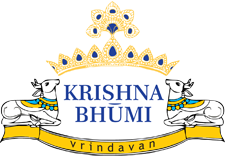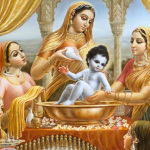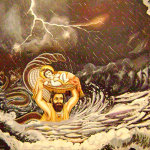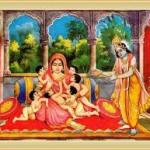Lesser known facts of the night of Janmashtami
The story that began in Satya Yuga with Prajapati Sutapa and Prsni, is finally coming full circle as we discuss the events of the night we now celebrate as Janmashtami. What happened on this night is a famous story and is recounted every time this day arrives. But very few people have followed this story from the origin. If you have been reading all the blogs, then now you know how several storylines came together so that the events of Janmashtami could transpire without any glitch. We are going to discuss the final leg of the story now.
When telling this story, people usually focus on Devaki, but there are three other women who must be mentioned here to completely understand the story. As has been mentioned earlier, the 7th time Devaki was with child, it was Balaram in her womb. By divine design, this baby had been transferred to Vasudev’s other wife, Rohini’s womb. Here in Mathura, it seemed like Devaki had lost her child. Rohini had already given birth to Balaram, who would later become Krishna’s elder brother and closest friend.
Vasudeva’s elder brother, Nandalal, who was the head of the gopa tribe, resided in Gokul with his Queen, Yashoda. Yashoda was also with child at this point. The child in her womb was none other than Devi Yogmaya, who is said to be the source of all of Lord Vishnu’s power.
Another aspect of the story that people hardly know is that of Queen Kunti. Kunti, at this point, was also with child. This child would grow up to be Arjuna. Kunti is also Vasudev and Nandalal’s sister, which means that Krishna and the Pandavas are related, they are cousins. And Kunti too gave birth to Arjuna the same night on which Lord Krishna was born.
Finally the night arrived when the rain raged outside the palace, and inside, in the prison cell, Devaki’s labor pain had started. After a while, just before Devaki was about to give birth, there was a divine voice in the cell, but only Vasudev and Devaki could hear it.
‘Vasudev, as soon as Devaki’s son is born, take him to Gokul to Nandalal and Yashoda’s house. Yashoda will also give birth tonight. Place your son beside Yashoda and bring her daughter back here. Your son must live, he is coming to vanquish all evil and re-establish law and order. He is the savior of humankind. Nandalal and Yashoda will be deep in sleep and will not know that the exchange has happened.’
Devaki’s labor pain had reached its last legs and she knew the baby was going to come any second now. Just then, as if by a miracle, the guards stationed outside the cell fell into a deep sleep and the shackles binding Devaki and Vasudev fell open on their own. After a while, Devaki gave birth to a beautiful baby boy. The baby had four arms because Lord Vishnu had manifested in his original form, and his complexion was so dark that his skin almost had a bluish tint.
For a while, mother and father wondered at their newborn, but Vasudev knew what he must do and that he did not have much time. As if understanding everything by Vasudev’s expression, the baby changed into a normal form, with two arms. Vasudev tried the door of the cell and found it open. Stepping outside, he noticed a basket lying to one side of the corridor. He placed the baby in it and set out, with Devaki uttering her final goodbyes to her son.
The river Yamuna flowed between Mathura and Gokul, and while usually, it was a tame and shallow river, right now, due to the torrential rain, the river had swollen in-depth and the current in those pitch-black waters was strong. Vasudev cautiously stepped in and soon the water was up to his chest. He raised the basket over his head to save the child but also worried that the baby would get soaked in the rain.
Just then, a huge multi-headed snake started following him, providing a canopy to the baby and him. At first, seeing this huge creature, Vasudev was terrified. But then he realized that this snake was simply Seshnag, who provides a canopy to Lord Vishnu, and he was just fulfilling his duty.
Having crossed the river safely and thanked the serpent, Vasudev hurried to Nandalal’s house. As promised, everyone was in a deep slumber and he faced no obstruction. Entering the master bedroom, he saw that Nandalal and Yashoda were asleep, only the baby girl was awake as if awaiting his arrival. He quickly made the exchange and hurried back to Mathura.
With Seshnag assisting him as before, he crossed the Yamuna with the infant girl. Reaching the palace, he quickly entered the prison cell, locked himself in and placed the girl beside Devaki. Immediately the shackles were back in place and the guards woke up. Seeing the baby beside Devaki, their leader ran off to inform King Kansa.
Moments later, Kansa arrived. There was a demonic glee in his eyes because he was finally about to kill the cause of his future death. As with every other child, he picked the baby up and swung her by the legs, intending to bash her brains out against the wall. But then the baby girl slid out of his hands and assumed her original form. This is the first manifestation of Devi Yogmaya, later she would manifest again and again and would be known by many names.
Hovering in mid-air, the magnificent Goddess laughed.
‘Kansa, the one who is meant to kill you is safe in Gokul! And when he is of age, he will come to kill you. You cannot evade your fate, no matter how hard you try!’
With this, the goddess vanished, and everyone was left speechless.
And indeed, while Krishna was growing up, Kansa made numerous attempts to kill him, sending daityas disguised as humans, but his attempts were in vain. What was meant to be, came to be, and Kansa died at the hands of Lord Krishna.
Devaki’s Story (II)
In the earlier blog, we centered our attention on Devaki, Lord Krishna’s biological mother, in order to understand another thread of the story and also to know the reasons behind the inordinate amount of tragedy that Devaki faced in her lifetime. As mentioned earlier, to truly understand this side of events, one must look at two storylines. The story of Devaki’s earlier life as Aditi, the 1st reincarnation of Prsni, has already been told. Now it’s time to discuss the second thread.
Maharshi Marici and Urna Devi had six demi-god like sons. Their names were Smara, Udgitha, Parisvanga, Patanga, Ksudrabhrta and Ghrni. The story goes that once the Universal Grandsire, Brahma, was running after his daughter Saraswati, trying to placate her for some reason. These six boys happened to chance upon this scene and were impudent enough to laugh at the scenario.
Unfortunately for them, Brahma noticed, and enraged, he cursed them to be born as Daityas in their next lifetime. By virtue of this curse, they were born as sons of Kalanemi and grandsons of Hiranyakasipu in their next birth. Now Hiranyakasipu was one of the most famous offsprings of Diti, hence a very powerful Daitya, who hated Brahma. But these six sons were nothing like their grandfather or father and secretly admired Brahma.
Secretly admiring him was fine, but they went to the extent of performing severe austerities for receiving a boon from him. Brahma, pleased with their dedication, appeared to them, and gave them the boon of protection from death in that lifetime. But things went wrong when Hiranyakasipu found out about this. Enraged that they would worship the God that he hated and that he couldn’t even harm them because of the boon that they had received from Brahma, he cursed them.
The curse dictated that in their next lifetime they would all be killed by their father upon birth. These six sons were the same six sons that Devaki gave birth to. She named them Hamsa, Suvikrama, Kratha, Damana, Ripumardana and Krodhahanta. Together, they are known as Sad-Garbha. They were killed by Kansa upon birth, who was, as mentioned earlier, a reincarnation of Kalanemi. Hence, Hiranyakasipu’s curse was fulfilled.
The seventh time Devaki was pregnant, it was Balaram in her womb, but by divine design, this fetus was transferred to Vasudev’s other wife’s womb. This wife was Rohini, who was safe in Gokul. Hence Balaram was saved and here in Mathura, it seemed like Devaki had gone through a miscarriage. Finally, the eighth time, she was pregnant with Lord Krishna.
Much later, after Krishna had grown up and was visiting Devaki and Vasudev, Devaki placed a request before him. She had heard how he had brought Sandipani Muni’s son back to life and trusted that he could do the same with the six sons that she had lost. This is when Krishna travelled to Sutala Puri, where the souls of these six sons were residing, under the King of the Daityas, Bali.
When he explained their history to Bali, Bali released them to Krishna, who in turn took them back to Devaki. After a brief reunion of Mother and sons, they finally broke free of their curse and returned to the abode of the demi-gods.
Thus with this, we have completed discussing all the threads that have led up to the events of the night of Janmashtami. In the next blog, we will look at the last, most known and the most popular set of events and with that, we will conclude this series of blogs.
Devaki’s Story (I)
The mistake we make with the story of Lord Krishna’s birth is that we think it is only about that one night, which we now call Janmashtami. But what we fail to understand is that the story had begun ages ago, so many threads and so many characters had to come together to create that one historic night, when Lord Krishna was born and it was prophesied that he would be the one to kill Kansa. One thread that we have already discussed is that of Kansa himself.
Now another character takes center stage, and she is none other than Devaki, the biological mother to Lord Krishna. Even with Devaki’s history, there are two storylines that must be discussed in order for one to truly understand why Devaki was destined for bearing so much pain in her lifetime. The first storyline is that of Devaki herself. Hence it makes sense that we look at this side of events first.
Right in the beginning it was mentioned that Devaki is the second reincarnation of Prsni, who had, with her devotion, been granted a boon by Lord Vishnu, that he would be born to her thrice. The first time Prsni was reincarnated, she was Aditi, King Daksha and Queen Panchajani’s daughter. She had many other siblings, but the one who is of interest in this story is one of her sisters, Diti. Diti, Aditi and 11 other daughters of Daksha and Panchajani married Kashyapa Muni, who in turn was a reincarnation of Prajapati Sutapa.
Hence, Lord Vishnu’s chosen couple had come together again and as discussed earlier, Lord Vishnu took birth as their son Upendra or Vamana. But right now the focus is on Aditi’s other offspring. Aditi also mothered Indra, the God of lightning, thunder, rain and war. Diti was jealous of Aditi and especially of the fact that she had such a powerful son as Indra. Many of Diti’s children fought Indra, and a lot of them died.
At this point, Diti had only one aim in life, and that was to bear a son more powerful than Indra. At last, Diti appealed to their husband Kashyapa Muni that he grant her a boon, by which she would give birth to such a son. Kashyapa Muni warned her that the pregnancy would last a hundred years and that she would have to perform certain rituals every day. If she ignored any of these rituals, ever, then she and her child would both become vulnerable. Diti accepted the terms without hesitation.
It was the 99th year of Diti’s pregnancy and she was glowing with the aura of the powerful child inside her, who was almost ready to be born. On the other hand, Aditi was perturbed and decided to converse on the matter with Indra. Indra seemed nonchalant about the fact that Diti was soon to become a mother again but when Aditi explained to him that the primary objective of this child would be to vanquish him, he paled.
Mother and son knew that fair play would not work in this situation, hence they resorted to trickery. One fine day, Indra appeared in Diti’s chambers on the pretext of wanting to meet her. He noticed how radiant she looked and understood that everything his mother had warned him about was true. He showed concern about Diti’s well being and health and offered to stay with her and serve her until her child was born.
Diti knew she could not refuse Indra, but she also knew that the sacred rituals she performed every day would keep her safe. She accepted his offer.
One night while Diti was fast asleep, Indra used his weapon Vajra or thunderbolt on her womb. But he was aghast when the weapon diverted on its own and did not even go near her. Indra understood that Diti’s rituals were keeping her safe. He would just have to wait for a chance. When and if Diti made a mistake, that would be his opportunity.
Indra was patient, but Diti was so close to giving birth that he began to lose hope. And then one night, it happened. Weighed down by her swollen belly, Diti was so exhausted that night that she forgot to perform the ritual of washing her feet before going to bed. She fell asleep with dirty feet. Indra took this opportunity, used his Vajra and split her fetus into 49 pieces.
Diti immediately woke up and she knew her child had been destroyed. She directly asked Indra if he had murdered her unborn child. She was such a terrifying figure then, trembling with loss and rage, that Indra stammered, and in that moment she cursed him. By dictate of this curse, Indra would never be able to rule peacefully, something or someone would always be in his way.
Indra, realizing that Diti was powerful enough that her spoken curse would come true, tried to convince her to take her curse back by blaming Aditi for the plan. Diti, further enraged by Aditi’s involvement, cursed her too. She condemned Aditi to be born as a human in her next lifetime and also said that her children would be killed in front of her and she would not be able to do a thing.
All of this happened in the Treta Yuga.
Finally, in the Dwapar Yug, Prsni, who had been reincarnated as Aditi, was once again reincarnated as Devaki. And by the curse of her previous lifetime, Kansa killed her children in front of her, one by one, and she was helpless. But the events that led to Devaki bearing so much sadness in her lifetime do not end here. There is another thread, another storyline, which when comes together with this one, brings it all full circle. We will discuss those set of events in the next blog.
Kansa: The despotic ruler of Mathura (II)
Love does affect the decisions of a person; it affected the decisions of King Kansa too. With his father-in-law and Magadhan King, Jarasandha’s support, Kansa had become almost invincible. His parents feared him, his people feared him, and other kingdoms feared him. But while enjoying all that fear that he incited, there was one person in his life whom he dearly loved. Ugrasena’s brother Devak had many daughters, but amongst them, Devaki was the apple of King Kansa’s eyes.
As Devaki reached womanhood, Kansa desired to marry her off to a man deserving of her and wanted to see her settled and happy. Hence, a Swayamvar was held to find a befitting groom. This event was attended by many eligible men from royal families. Among them was also Vasudev, son of Yadav King Shurasena. At the end of the competitions, when it was decided that Prince Vasudev would be the one to marry Princess Devaki, King Kansa’s happiness knew no bounds.
The marriage ceremony completed, the newlyweds had to set out on the road to Gokul, where the ancestral Yadav clan home was. Kansa gifted them 400 elephants and a hundred chariots. The royal army was also asked to escort them all the way. As a final gesture of love and affection, Kansa proclaimed that he would drive Vasudev and Devaki’s chariot himself. What happened en-route completely changed the festive situation.
Suddenly the sky grew dark and a heavenly voice spoke, “Beware you fool! You love your sister very much and are driving her chariot; however, you will die at the hands of her eighth son!” Kansa, angered by the fact that the sister on whom he had showered so much affection, would mother his killer, grabbed his sword and lunged at her. Vasudev intervened and reminded him that Devaki was still his beloved sister and that in this situation; she was not directly at fault.
Finally, Vasudev convinced Kansa that killing Devaki was not the only way. He promised that they would remain in Mathura, imprisoned in Kansa’s cells. He also promised that each time Devaki bore a child, the newborn would be handed over to him.
What must it have been like to have entered a prison cell after marriage instead of a Palace? What must it have been like to know that motherhood would come, but so would infanticide? These are aspects that the next blog will explore.






